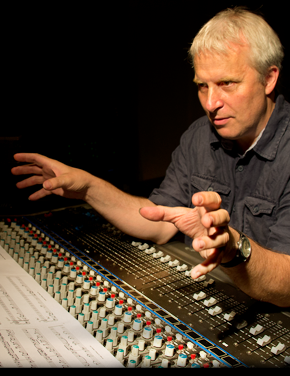Stefan Deistler is a hard working producer and recording engineer. He’s been flying the faders since the early '90s, and in that time has worked in a plethora of genres including classical, rock and roll, and jazz. His studio is based just outside Cologne in Germany - arguably the best city in Deutschland for jazz musicians and venues, so it's little wonder that jazz has become his musical mainstay. We sat down with the man himself to chat about the industry as a whole, and find out more about the vibrant local scene.
“I’ve been working on a few projects at The Loft in Cologne,” Deistler says. “It's a wonderful venue, which is also a great recording studio, complete with a Steinway grand piano. I’m also recording mobile for the WDR, which I would say is the second biggest radio station in Europe after the BBC!”
Impressive - and we're already jealous of the piano... So how did this journey begin, then?
“Well, I learned how to play guitar when I was younger; and then a friend of mine was the director of the School of Audio Engineering in Frankfurt – that was the golden age of studio engineering in Germany, the late '80s and early '90s," Deistler reflects. In what sense, golden? "There were hardly any of us engineers around! [laughs] And because of that, it was quite a bit easier to make money from this [industry] back then.”
A fair point, indeed. The recording game has changed, no question - but in what ways has it become more difficult?
“There are basically too many people of my sort now,” Stefan admits, laughing. “The educational scene [for audio engineers] has grown a lot, and there are too many people doing it now, so the market has become cheap.”
Has the new generation of youngsters running studios out of their bedrooms, thanks to equipment becoming more affordable, also had an impact?
“It has influenced things, of course, but fortunately, I was already established when this started happening, so it hasn’t been a huge problem for me," Deistler says. And Cologne is still a good home for a recording hub, then? “Oh, absolutely; it's the capital of jazz in Germany - well, perhaps second to Berlin - and that's largely thanks to the conservatory here.
"Because I work at The Loft, I meet a lot of new jazz artists all the time – the Guardian put it in their top 10 jazz venues in Europe, in fact. I recently did a CD master for Simon Nabatov, a piano player - a really, really good piano player. He’s quite amazing when it comes to jazz improvisation, but I wouldn’t just call him a jazz musician, either. The musicians I work with are definitely eclectic over here."
We sense it must be tricky to pick out a career highlight from working with so many different artists, but we ask anyway. Deistler decides it's the 2008 live recording he did for Mitch Ryder, a rock musician from Detroit:
“I loved him as a young boy, so it was an honour to record for him; and that recording still holds its own against other projects I’ve done since. Another high point was two years ago, the John Scofield trio played here in the Philharmonic, and that was also really amazing to work on.”
Sonic Boom
Deistler’s career has been synonymous with RME audio interfaces – he’s been using them since the '90s, pretty much as long as he's been in the biz.
“I first had the [RME] Digi 32, which in those days was a stereo card," Deistler recalls. "It was the first one which was really reliable, and worked. It doesn’t change the channels, which often happens these days, but this was back in 1995. After that, the first digital sound cards came out, and it became comfortable to edit audio on computers.”
It’s clear that Deistler is a true veteran when it comes to using music technology, and he also owns an abundance of RME kit:
“I use the Octamic, the MADIface XT, MADIface USB, and the Babyface, which works excellently with the HR converter," he explains. "I used Babyface for a recording in Amsterdam recently; it’s a small but great working set up. I’ve also got an ADI-8 DS, an ADI-2, and I’m thinking of buying a new converter: the ADI-2 Pro, I think it’s called, but it’s not on the market yet.”
Wow. And does each one have a specific use, or is this simply a collection?
“[smiles] Well, in the studio I just have the HDSP Hammerfall 9632,” he says, continuing to amaze us with his ability to recall all these different names and model numbers. “The rest I use for live recordings... Even the MADIface, I use out of the house.”
Although the RME sound quality is a given, Deistler says the main reason he uses anything by the manufacturer is that it won't go wrong... ever!
"You never get any clicks or pops from any of the RME kit," he confirms. "I hear from a lot of friends with cheaper interfaces that they aren’t able to transport just to channels, which I think is funny in the year 2016! But with RME, even transporting 64 channels is easy, and absolutely reliable.”
For Deistler, work has always come in on a month by month basis, so it’s difficult to say exactly what happens next, though we do get the sense that he’s never short of requests. He's one of the busiest studio maestros in Germany, after all, and long may he reign.
